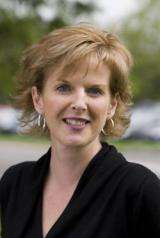Helping Loved Ones Bereaved By Suicide Or Self-Inflicted Death

(PhysOrg.com) -- Research by a University of Derby sociologist explores how families bereaved by suicide are finding ways to deal with the enormity of their loss. Caroline Simone, Subject Leader of Joint Honours Applied Studies, has spent more than two years conducting in-depth 'narrative research' for her doctoral studies with 24 people from across the country whose parents have died from suicide or a self-inflicted death.
(In the current research project, interviewees frame their parent's deaths as suicide, whether or not their parent's self-inflicted deaths have been recorded as suicide, misadventure, accidental death, undetermined injury or unknown verdicts).
Caroline is also a Sociology Lecturer on the Death and Society module at Derby and a trustee of the national suicide bereavement organisation Survivors of Bereavement by Suicide.
As World Mental Health Day approaches, she has revealed her qualitative research progress which she hopes will guide practitioners; and other bereaved families to understand and normalise their emotions, experiences, memories and other issues surrounding bereavement by suicide.
Of a total of 28 participants, 24 have been parentally bereaved by suicide or self-inflicted death. Three others work either in the clinical or non-clinical to support suicide-bereaved people. The final participant was the project transcriber.
The sensitive and harrowing stories Caroline encountered has enabled her to build up relationships with people bereaved by suicide to develop an understanding of how they have dealt with their different bereavements.
Caroline said: "Not only does suicide create chaos and disorder, for the bereaved there is often a sense that taking control is beyond their capabilities.
"Suicide's aftermath can shatter a person's sense of security, and mediating understandings of the death is often just too painful.
"This research has been used to develop a useful framework to illustrate how loss, emotions and landscape can be used to create order out of disorder after a suicide."
As a result of her research, Caroline has produced two peer-reviewed papers: Walking the Walk: Memorialising the Suicide Victim (forthcoming 2010), and Parental Suicide: The Long-Term Impact on Children and Young People (2008). Chaos to Quest, Restorative narrative transitions in suicide bereavement is also being peer-reviewed by an international journal.
Walking The Walk: This academic paper profiles the experiences of two research participants. One 'walked the walk' to retrace her mother's last footsteps more than 20 years after her death and another participant re-enacted his father's last few hours almost 40 years after his death.
Caroline argues that the study illustrates how the physical environment can be used to retrace the final hours and moments of their parent's lives.
She said: "As a strategy for creating memories, parentally bereaved people may eventually undertake a private 'pilgrimage' located in public places, retracing their parents final few hours, leading to the place of death.
"For them, these 'landscapes' had previously been saturated with negative associations and emotions. Yet, by tracing their parent's footsteps through an emotionally spatialised pilgrimage, both participants were able to re-evaluate their emotions and reconstruct their loss experiences."
She also adds that a violent, sudden and immediate severing of the parent and child relationship is such a huge loss which can be so overwhelming that many years may elapse before individuals undertake a search for meaning and identify a bond with the dead parent.
Chaos To Quest explores the silence that often surrounds suicide and which inhibits people from being able to heal.
It suggests talking is a powerful tool to help the bereaved to reclaim some personal security and empowerment. It introduces the terms 'restorative telling and listening' and a 'fellow traveller' to highlight that if individuals can share their experiences with fellow bereaved families, it can reduce the isolation and marginalisation they may otherwise feel through the death.
The research also identified that suicide-bereaved children are often told ambiguous details after the suicide of a parent as a relative may feel talking about it could be emotionally harmful to everyone involved.
Provided by University of Derby














